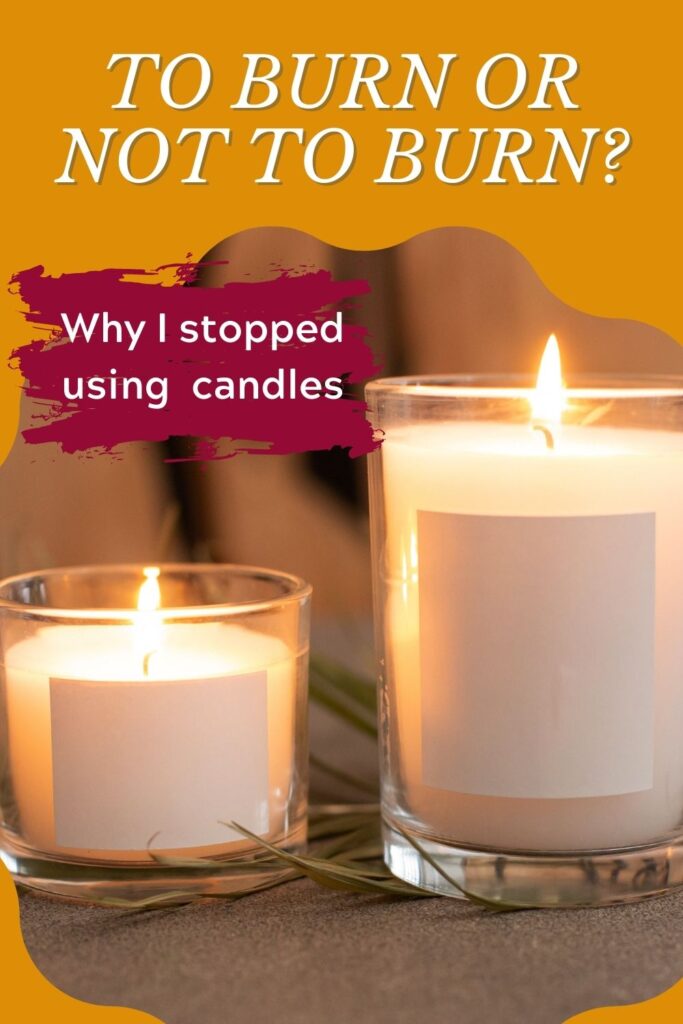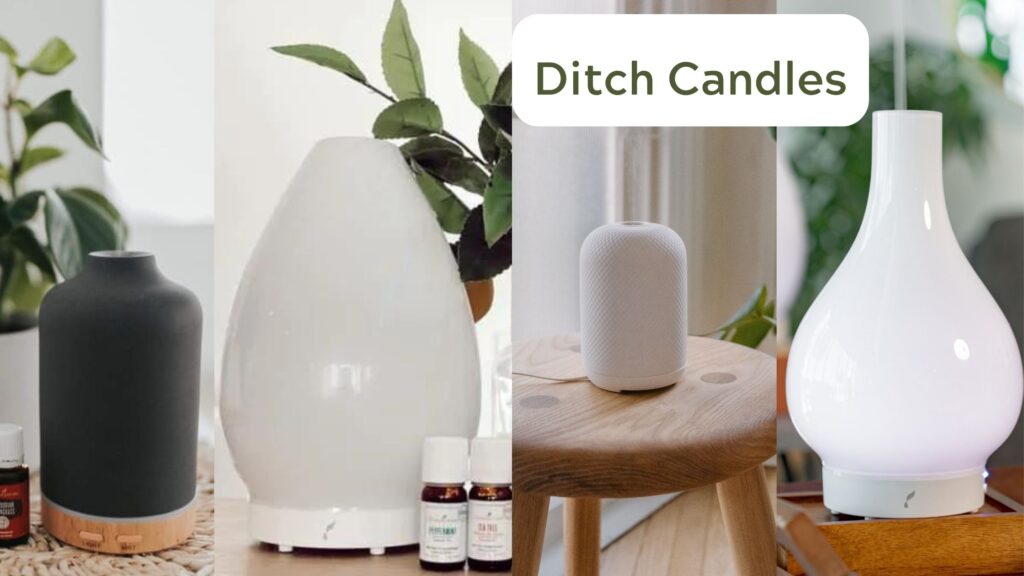As fall and winter approach and the seasonal décor makes an appearance, people often burn candles to enhance the indoor environment. When cold weather keeps windows closed to fresh air, homeowners delight in using candles to fill their homes with fragrances to create a homey and nurturing living space. Unfortunately, the fragrances and candle emissions can be harmful to your health.
If you search the internet, you can find articles both supporting candle use and citing candle use as harmful. So, what’s the real story?
To Burn or Not to Burn?
Those who believe burning candles is harmful cite smoke and toxins as the two primary negative effects of burning candles. Perhaps you think those effects are negligible. But if you burn candles daily through the fall/winter seasons, the effects are compounded.
In addition, we are daily bombarded with toxins in our environment, both in and outside the home: pollution, chemicals from cleaning products, chemicals from personal care products, emissions from furniture and carpet, and more. This leads to bioaccumulation. This means our bodies take in more chemical than they can safely metabolize or eliminate, leading to a build up inside us.[i] You can read more in my book.
We cannot control everything. When we go outside, we cannot control what we breathe. But when we are inside, we have some control, minimal though it may be. Why not take control where we can? We control whether to burn candles in our homes.

Ten Reasons I Ditched Candles
I am the gatekeeper of my home and my family’s health. As a result, my choice is no candles. Although I had never been an avid candle burner, I ditched them entirely about eight years ago. My choice stems from the following premises:
- Candles aggravate allergies. As someone with a lot of allergies and sensitivities, I could never tolerate candles. I occasionally used vanilla or cinnamon candles, but only because my husband loved them. When I learned about synthetic fragrance, I understood why I had sensitivities. When I learned the harmful effects, that was all I needed to ban them from my home.
- Smoke is harmful to your health. Candles emit smoke. And smoke is bad for your health. A Denmark study states, “The harmful effects of candle smoke included lung inflammation and toxicity, arteriosclerosis, and ageing effects on chromosomes in the lungs and spleen.”[i] One pediatrician says that burning a scented candle for an hour is like smoking one cigarette. That’s because of soot emitted into the air by candles with wicks containing zinc, tin, and lead.[ii]
- Smoke is harmful to your home. Repeated use of candles leaves a residue on your walls and furniture. It also increases the air pollution in your home.
- “Fragrance” hides chemicals. Beware of anything labeled “fragrance.” Most candles include a synthetic fragrance. Ninety-five percent of these are derived from petroleum products. Chemicals such as phthalates can disrupt hormones and are linked to other health issues. “In the U.S., manufacturers can legally hide hundreds of synthetic chemicals in the one word–“fragrance”–without revealing what those ingredients are.”[iii]
- Petroleum products create toxic waste. Paraffin wax, which is made from petroleum products creates toxic waste, which is as dangerous as second-hand smoke from cigarettes.[iv] A black ring of soot around the jar of a burned candle is a warning sign.
- Harmful effects of ultra-fine particles. Researchers continue to explore the possible harmful effects of burning candles. Candles disperse fine particles into the air, particles so small they cannot be seen with the naked eye. A study from 2019 explains that as instruments used to count ultra-fine particles become more sophisticated, smaller and smaller particles can be measured. Those smaller particles appear to be responsible for even greater toxic exposure because of their ability to penetrate cell membranes and collect in mitochondria, and possible penetrate the blood-brain barrier. These affect inflammation, oxidative stress, respiratory and cardiovascular systems, and mortality.[v]
- Candle use exacerbates respiratory issues. No matter where you stand on candle use, the consensus is candles are not good for those with respiratory issues. The incidence of asthma is increasing each year in the United States.[vi] Those with asthma, COPD, chronic bronchitis, or any other respiratory challenges should stay away from anything that produces potential breathing problems.
- An open flame is not safe for small children and pets. With small children and pets around, an open flame is always a risk. And even adults make mistakes. I remember an incident when I burned candles in my home. I had a candle burning on a small table beside my chair. I got up and removed the sweatshirt I was wearing. As I walked away, I tossed it back onto the chair. I had forgotten about the candle, and my sweatshirt landed on it and began burning. That sweatshirt didn’t survive. I’m fortunate I caught the problem quickly.
- Other concerns, like lead. The Consumer Product Safety Commission banned lead-core wicks and candles with lead-core wicks in 2003 because they posed a health risk to young children. However, one can never be 100% certain that imported products, or even domestic ones, follow all guidelines. As recently has 2014, a University of Michigan professor measured lead emissions from 14 different brands of candles.[vii] Studies indicate that lead-core wicks still appear on the market. Additionally, other metal wicks may emit harmful toxins. I prefer not to take the risk.
- There are safe alternatives. Ridding your home of candles does not mean you have to go without pleasing aromas in your home. Essential oil diffusers, when used with pure essential oils, not only provide an alternative to candles, but also may boost and support your wellness rather than harm it.
Do Your Own Research
Do your own research if you’re not convinced. Start with peer-reviewed articles. Public libraries and colleges share abstracts and full resource texts of many published studies. Searching Google will produce a lot of information, but articles vary in reliability.
If you aren’t fond of research, then perhaps you share my viewpoint. Why use candles when there is healthy alternative?
Embrace a healthier lifestyle and ditch candles. Small changes often reap big rewards. Be an informed gatekeeper of your home.
[i] Widmayer. (2019). Set Your Mind: Finding Wellness Through Intention. Set Above LLC.
[i] https://www.besthealthmag.ca/article/news-candle-smoke-could-be-as-toxic-as-cigarettes/
[ii] https://www.boston25news.com/news/scented-candles-can-be-as-harmful-as-cigarettes-doctor-says/8572163/
[iii] https://www.huffpost.com/entry/five-mustknows-on-the-dan_b_4737654
[iv] https://www.haywardscore.com/articles/the-truth-about-scented-candles/
[v] https://web.s.ebscohost.com/ehost/pdfviewer/pdfviewer?vid=8&sid=df2be2d1-3a4b-41d3-9281-10d944f6295b%40redis
[vi] https://www.cdc.gov/vitalsigns/asthma/index.html
[vii] https://www.anapsid.org/cnd/mcs/candles.html

